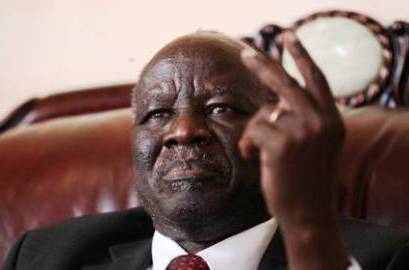Pre-transitional period requires two months extension: Akol
October 22, 2019 (JUBA) – Parties that signed South Sudan’s peace deal should give themselves more two months before a transitional national unity government is formed, a leading opposition figure warned with less than a month to the November 12 deadline.

“There can never be a shortcut to security matters. We learned that in a hard way,” he added.
Akol, who heads the Opposition National Democratic Movement (NDM), said government’s insistence to form the TGoNU before settling the issue of the numbers of states is driven by its desire to impose its 32 states as a “fait accompli”.
“What incentive has those whose lands were grabbed as a result of the creation of these mini-States to join such a government?” he asked.
Lam, who also doubles as the Secretary General of South Sudan Opposition Alliance (SSOA), warned of a likely outbreak of the violence similar to the one that occurred in Juba in July 2016.
Hundreds of soldiers were killed when forces loyal to President Salva Kiir clashed with those allied to the country’s former First Vice President, Riek Machar at State House, forcing the latter to flee Juba.
“Today, we are in October discussing the same two issues: security arrangements and the number of states in the country. We saw and lived what happened when these issues were glossed over not long ago,” stressed Akol.
The delegation from the Security Council on Sunday called on South Sudan leaders to reach a compromise and rescue the fragile 2018 peace agreement from collapse.
The call came hours after the armed opposition faction (SPLM-IO) led by Riek Machar threatened not to be part of a new government.
“There is an opportunity for the leaders of South Sudan to make political compromise and move forward to the next phase of the peace process in a credible, transparent and accountable manner,” said Kelly Craft, the United States ambassador to the UN.
In September 2018, the warring parties involved in South Sudan’s conflict signed a peace deal to end a civil war that killed tens of thousands of people and displaced millions.
The Security Council delegation, on a visit to the South Sudan capital, Juba acknowledged that progress has been made since then, with a ceasefire significantly improving the security situation.
“We noted the reduction of political violence which has contributed to the return of 594,000 displaced people, increased food production, enhanced humanitarian access, and increased commerce among communities,” said Jerry Matthews Matjila, the South African envoy to the UN and Council President for October.
However, key outstanding issues remain which are having an impact on the progression of the peace process. They include decisions on states and boundaries, as well as the reunification of security forces.
The Security Council delegation held separate meetings with President Kiir, Machar and other signatories to the peace agreement, urging them to expedite its implementation and meet the November 12 deadline for forming the transitional government.
South Sudan descended into war in December 2013 when Kiir accused Machar of plotting a coup.
In May, the two sides agreed to form a unity government in six months and in September said that they will establish a transitional government by November 12 as part of the deal.
(ST)
